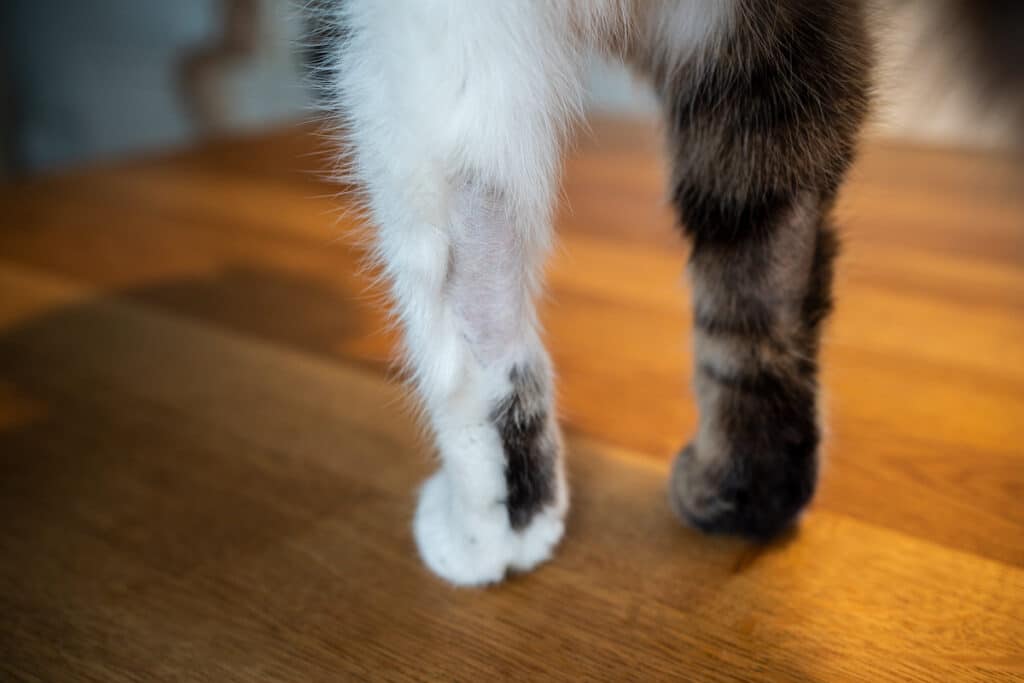Keeping your cat’s fur well groomed is an important part of caring for your pet. However, over-grooming can lead to a number of health problems. Read on to find out what to do if your cat’s fur looks dirty or is starting to fall out.
Psychogenic alopecia
Often overlooked by cat owners, psychogenic alopecia in cats is a common cause of hair loss in felines. It is a condition where cats engage in excessive grooming.
Cats with psychogenic alopecia may exhibit redness and inflammation in the affected areas. They may also have secondary skin infections. It is important to rule out other causes of hair loss in cats before making a diagnosis.
Cats with psychogenic alopecia may have hair loss in multiple areas. They may also be excessively shedding because of itchy skin. Cats with severe baldness are at increased risk of hypothermia. They may also develop scabs and rashes.
Cats who exhibit symptoms of psychogenic alopecia are often diagnosed with another condition. Some cats with psychogenic alopecia may have a skin condition such as atopic dermatitis. It is important to have the underlying skin condition diagnosed. If the skin condition is found, cats can be treated with medication.
Fleas
Fortunately, there are a variety of treatments available to get rid of the fleas. Flea treatments can include spot-on treatments, topical medications, and flea control. They can also be used to help prevent the fleas from infesting the home.
A vet can help you determine the cause of your cat’s excessive grooming. The doctor will also be able to recommend a treatment that will work best for your cat. Usually, a combination of medication and behavior modifications is necessary to achieve success.
While it is true that fleas are the most common cause of cat over-grooming, they are not the only culprits. Mites, skin disease, and allergies can also cause excessive grooming.
A vet may be able to determine if your cat is allergic to flea saliva or if there is an underlying medical condition that is causing excessive grooming. A vet may also recommend a fungal culture to rule out ringworm or another skin disease.
Food allergies
Whether your cat suffers from food allergies or not, it can be frustrating to see it suffer from excessive grooming. This can be a medical condition or a behavioral problem. However, there are ways to help your cat deal with the over-grooming.
It’s important to understand that a cat’s skin is an extremely sensitive organ. Over-grooming will lead to significant trauma, which can lead to skin irritation and even skin lesions. A cat’s skin can also have an inflammatory response. This can lead to open wounds, which can be infected with bacteria or fungi.
One of the best ways to identify if your cat has a food allergy is to introduce a new food to see if it causes any adverse reactions. If it does, you can then switch your cat to a new diet.
Stress
Identifying the root cause of your cat’s stress can help alleviate the problem. Several methods of diagnosing over-grooming include bloodwork, urine analysis, and skin tests. A vet can recommend treatment options, such as medication, e-collars, or a calming supplement.
Cats are highly intelligent creatures that thrive on routine. When their routines are disrupted, they become stressed. They may begin grooming themselves as a form of coping. Over-grooming can also be a result of pain or an underlying medical condition.
Some cat breeds, such as Oriental breeds, are more likely to over-groom. When the skin barrier is compromised from excessive licking, a secondary bacterial infection can occur. This type of infection is treatable with topical antibiotics or oral antibiotics.
Over-grooming can also be triggered by fleas or parasites. These pests can cause irritation and an allergic reaction. A cat may lick itself raw to soothe the irritation. Flea collars and flea baths can help prevent over-grooming.
Keeping an eye on the condition of your cat’s fur
Keeping an eye on the condition of your cat’s fur when over-grooming is important, as it can be a sign of a health problem. You should keep an eye out for signs of skin problems, hair loss, fleas, and other problems.
Skin problems may be caused by a variety of things, including parasites, allergies, or a disease. If your cat has fleas, check his or her fur for specks of black pepper, which is flea dirt. This contains the cat’s blood.
Cats can also develop allergies to food, environment, or other things. An allergy can cause your cat to lick or scratch his or her skin obsessively, which may cause hair loss. If you suspect your cat may be allergic, you should do allergy testing before attempting to remedy the problem.














